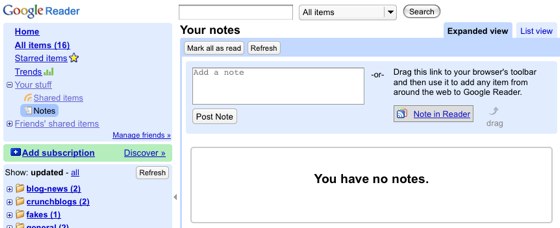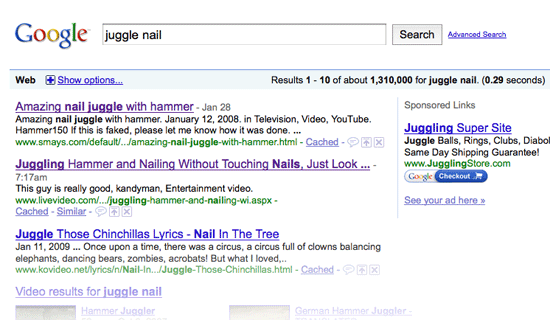Increasingly, many of the most interesting things I discover online wind up on my “shared items” page in Google Reader (rather than here in the body of the blog). I started “sharing” items in May of 2007 and the list has grown to 1,150 new stories, blog posts and articles.
Tag Archives: google
Journalists in demand at SEO companies
“You can try all kinds of tricks to improve how highly your site ranks in Google and other search engines, but ultimately it comes down to linked content — which generally correlates with good content. And in order to get good content, you need journalists.” — Paul Bradshaw, Media Tidbits]
Google CEO Eric Schmidt
Last week Google CEO Eric Schmidt was interviewed by CNBC’s Jim Cramer (Mad Money). Terry Heaton provides an insightful summary of special interest to local media companies:
“He said the company gives up billions in revenue by keeping ads off the home page. Why? Because it would upset users. “We prioritize the end user over the advertiser,” he told Cramer. This simple statement — if truly adopted by media companies — would revolutionize all of online media. We’d have a race to see who could better serve the wants and needs of the people formerly known as the audience, and that would be a refreshing change from words like capture, drive, and my favorite, monetize.
Google doesn’t provide any guidance whatsoever to stock analysts, and Schmidt’s answer, again, is profoundly simple when he says it would “get in the way” of running the business, adding, “If we started giving quarterly guidance, all of a sudden the whole company would start focusing on the quarter rather than trying to change the world.”
On the company’s heretofore unsuccessful attempts to make money from YouTube, Schmidt said it didn’t matter, at least not right now. He said they make plenty of money already, because YouTube places users in the stream of Google’s other businesses, and that cannot be overlooked. “I’d be worried if people weren’t using to YouTube,” he told Cramer. “Since it’s an enormous success globally, we know we will eventually benefit from it.”
Google Reader ads nifty Notes feature
 Google Reader is my RSS reader of choice. It makes it possible for me to keep up with about 100 blogs and websites. The “Share” feature (which I mention here from time to time) let’s me flag and post a story to my “shared stories” page. Just click the “more stories” link at the bottom of the little blue box on the right side of this page.
Google Reader is my RSS reader of choice. It makes it possible for me to keep up with about 100 blogs and websites. The “Share” feature (which I mention here from time to time) let’s me flag and post a story to my “shared stories” page. Just click the “more stories” link at the bottom of the little blue box on the right side of this page.
Google has added a Notes feature that let’s me share a story AND include a brief note about it. I can also highlight text on a web page, click the “Note” button in my browser toolbar and add the text… with my note… to my shared page.
I know, it’s a little confusing. But this is good shit. There’s a social networking aspect to this but let’s not go there right now.
If you use Google Reader, check out the notes feature. You can get a better explanation at Techcrunch and the Google Blog.
Blogs = Google Juice
In January I posted a video clip of a guy bouncing a nail on the head of a hammer. Actually, he was juggling the nail on the head of the hammer. Just watch the amazing video.
Yesterday I received notification of a comment on the post. It was from Scot Nery, the man in the video. The clip had been pulled from YouTube and he provided a permanent link to the video.
I assumed he found the post with a Google search but since it didn’t include his name or any identifying data, I wondered what he searched for. When I tried “nail juggle” (without the quotation marks), my post was number one out of 213,000 results. If I’m clear on how Google works, those two words would give you every hit with either “nail” or “juggle.”
Think about that. Those are two pretty common words. And a lot of the results pertained to Scot Nery doing the nail thing.
Just one more example of the sweet google juice generated by blogs.
Google gets into local news
Google News now allows you to localize a section of the stories. Scroll down just beneath the fold for the box to type in your city or zip code.
“This is pretty huge, folks, and it spotlights the need for everybody in the local news business to adopt best practices when it comes to unbundled distribution,” writes Terry Heaton. True enough, as Google News ranked #9 in Nielsen-Netratings for December — higher than USAToday.com and WashingtonPost.com.
If you’re a local news guy and look at this and say, “Ah, but they missed some stories!” … you’re missing the point.
Pedal like your life depends on it!
 Bob lives in Madison, WI, where it’s damned cold. And every morning (and every evening) he hops on his bicycle and
Bob lives in Madison, WI, where it’s damned cold. And every morning (and every evening) he hops on his bicycle and peddles pedals five miles to work. Whatever the weather, no matter how cold. Or so he says and I want to believe him. I don’t know how you ride a bike in ass-deep snow but Bob says you can (special tires?).
He snapped this photo this morning. It was a few degrees below zero. Note his rosy cheeks.
When it’s that cold, what happens when you sling a bucket of warm water into the air? It freezes before it hits the ground.
Update: Willie Lohman “peddles” like his life depends on it. Thanks, E. for the reminder.
Google yourself
Why? This from Seth Godin…
If you’re a salesperson, your prospects already do.
If you’re looking for a job, your prospective employers already do.
If you’ve got a job, your co-workers already do.What do they see? Do you know?
…and this from Mindy McAdams (Teaching Online Journalism)…
“If you’re a journalist — or a journalism student who hopes to enter the field — this should concern you. First, what results do you get when you Google yourself (first name, last name, no quotation marks)? Most important, what are the top two or three links? I hope they do not go to pages about you that make you look like an idiot, a sex fiend, or a drunk.”
They both offer suggestions on how to improve your Google juice.
“Google is God”
That’s the title of a post by Jeff Jarvis featuring some amazing stats on Google. I’d post them here he deserves the page view for pulling them together.
Learfield 2nd best place to work
Google has been ranked No.1 in Forbes business magazine’s 2007 list of the 100 Best Companies to Work For in America, following a poll 100,000 employees from 446 companies. Check out some of the perks for Google employees.

